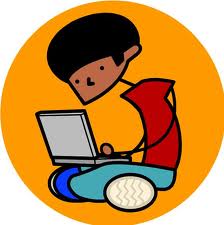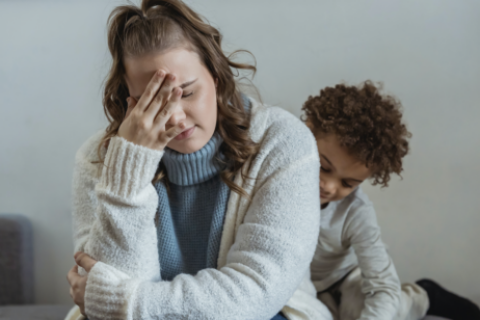In this era of screens, parenting has become even more complicated. There is something magnetic and addicting about screens, and that is apparent in the way children crave them and are hypnotized by them. As comedian Ronny Chieng joked, “Every night in America is like a competition to see how many screens we can get between our face and the wall.” On the one hand, screens have impinged upon children’s ability to be active and imaginative. The old days of playing impromptu four square and tee ball are fading. On the other hand, screens offer parents a peaceful breather and may help children to calm down and relax. Select screen-based games and shows can also offer excellent learning opportunities. So, what now? How do we know how much screen time is appropriate and when it’s becoming a problem?
What Do the Experts Say?
The American Academy of Pediatrics (AAP) suggests that children younger than 18-24 months should avoid digital media other than video chatting. For children aged 2-5 years old, screen time should be limited to just one hour a day of carefully selected content. For example – one high quality show, like Sesame Street, that emphasizes language and social development. It is preferable for parents to view the content with the child to encourage conversation and play based on the content versus static viewing. Parents can then support the child in understanding the content and rehearse it later in other circumstances to enhance learning. Face-to-face communication is what truly encourages language development in young children much more than passive listening. Under age 5, children need ample time to play, talk, and explore, and screen time hinders these growth activities. For children over 6 years old, specific limits are needed for screen time use, as it should not supplant children’s sleep or physical activity. The AAP recommends establishing “media-free” times together with your child, as well as locations that are media-free such as bedrooms. Maintaining these strict limits from the start will support your child in understanding the importance of other activities and will (hopefully!) reduce negotiation tactics. If unplugged time is fun and engaging, children are less likely to perceive limited screen time as a punishment. Considering older children, educating them about respect for others online and understanding when others may be unsafe or inappropriate online is important. Teens should be informed about privacy settings and risks of sending personal content.
Do Screens Affect My Child’s Development?
A study in JAMA Pediatrics found that 2-3 year olds in Canada who used screens for greater durations performed worse on developmental screenings at ages 3 and 5. Those screenings measured communication, social skills, motor skills, and problem-solving abilities. This suggests that screen time overload may impede early development, further highlighting the need for intentionality and planning for family screen time. Fresh off the press, a 2020 brain study has shown that children aged 3-5 who use screens for more than one hour per day without parent involvement have lower levels of development in the brain’s white matter. White matter is critical to the development of language, cognitive skills, and literacy. Early childhood is when the brain is most plastic and able to form new strong connections, so careful dosing of screen time is highly important. Want to increase your mindfulness about screen time in your family? This website may help you in doing so: HealthyChildren.org/MediaUsePlan.
Impact on Sleep & Fitness
In a review of 67 studies published from 1999 to 2014 concerning screen time among school-aged children and teens, findings consistently indicate that screen time is associated with poorer sleep outcomes. This means that, particularly just before bedtime, children and adolescents are recommended to reduce screen time to optimize quality sleep. Screen time has shown to be related to long-term fitness and health as well. A study on screen time in adolescence showed that weekly hours of screen time is predictive of obesity in early adulthood. This suggests that sedentary lifestyle habits that are established in adolescence, such as watching TV and playing video games, can influence future behaviors and health outcomes. Physical activity in adolescence can reduce the negative effects of screen time, but only very high levels of physical activity can counteract the effects of screen time.
What’s Good on Screens?
The American Academy of Pediatrics recommends doing your own research on digital products before your child uses them. Thousands of apps are “educational,” however this term can be used loosely. The AAP suggests referencing databases such as Common Sense Media (www.commonsensemedia.org) to obtain reviews for appropriate games for your child’s age and development.
It turns out that concern about screen time is not limited to experts. Teens themselves are worried about their levels of personal use, as 54% of US teens think they spend too much time on their cellphones. Some teens feel anxious without their phone or may check messages incessantly. Parents are also worried about their own personal use. Over a third of parents feel that they themselves spend too much time on their cellphones. This highlights the importance of practicing what you preach! If you advise your child or teen to limit screen time, then you as a parent will also want to model restraint and intentionality. If you’re at the movies or out to dinner, put your phone on ‘Do Not Disturb.’ It is challenging to resist the glow of the screen, but as a new year’s resolution we can all strive to be a little more present.
References
American Academy of Pediatrics Announces New Recommendations for Children’s Media Use. (2016, October 21). Retrieved from https://www.aap.org/en-us/about-the-aap/aap-press-room/Pages/American-Academy-of-Pediatrics-Announces-New-Recommendations-for-Childrens-Media-Use.aspx
Boone, J. E., Gordon-Larsen, P., Adair, L. S., & Popkin, B. M. (2007). Screen time and physical activity during adolescence: longitudinal effects on obesity in young adulthood. International Journal of Behavioral Nutrition and Physical Activity, 4(1), 26. doi: 10.1186/1479-5868-4-26
Children and Media Tips from the American Academy of Pediatrics. (2018, May 1). Retrieved from https://www.aap.org/en-us/about-the-aap/aap-press-room/news-features-and-safety-tips/Pages/Children-and-Media-Tips.aspx
Hale, L., & Guan, S. (2015). Screen time and sleep among school-aged children and adolescents: A systematic literature review. Sleep Medicine Reviews, 21, 50–58. https://doi.org/10.1016/j.smrv.2014.07.007
Hutton, J. S., Dudley, J., Horowitz-Kraus, T., Dewitt, T., & Holland, S. K. (2020). Associations Between Screen-Based Media Use and Brain White Matter Integrity in Preschool-Aged Children. JAMA Pediatrics, 174(1). doi:10.1001/jamapediatrics.2019.3869
Jiang, J. (2018). How Teens and Parents Navigate Screen Time and Device Distractions. Pew Research Center. Retrieved from https://www.pewresearch.org/internet/2018/08/22/how-teens-and-parents-navigate-screen-time-and-device-distractions/
LaMotte, S. (2019, November 4). MRIs show screen time linked to lower brain development in preschoolers. Retrieved from https://www.cnn.com/2019/11/04/health/screen-time-lower-brain-development-preschoolers-wellness/index.html
Madigan, S., Browne, D., Racine, N., Mori, C., & Tough, S. (2019). Association Between Screen Time and Children’s Performance on a Developmental Screening Test. JAMA Pediatrics, 173(3), 244. doi: 10.1001/jamapediatrics.2018.5056










